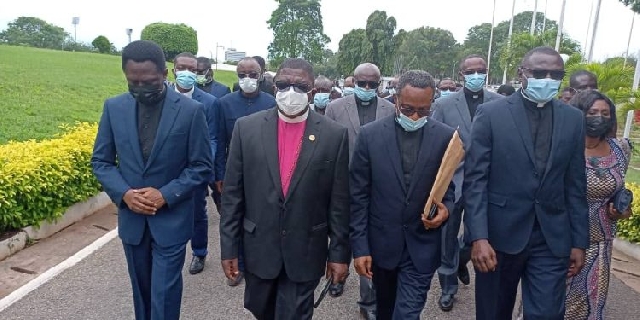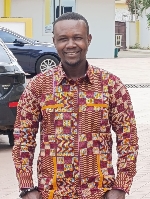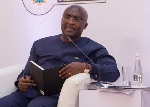Completely reject LGBTQI+ in Ghana – Christian clerics to Akufo-Addo
 The Christian clerics marching to parliament
The Christian clerics marching to parliament
Some Christian clerics led by the Chairman of the Church of Pentecost, Apostle Eric Nyamekye, have asked President Akufo-Addo to ensure that all avenues for LGBTQI+ sexuality are shut in Ghana.
They made the appeal when they, comprising the Methodist Church, Apostolic Church, and Christian Council, presented a memorandum to the constitutional, legal and parliamentary affairs committee in support of the anti-LGBTQI+ Bill before parliament.
The 36-page bill, which is yet to be considered by parliament, seeks to unequivocally criminalise LGBTQI+ activities.
Among other things, it says people of the same sex who engage in sexual intercourse are “liable on summary conviction to a fine of not less than seven hundred and fifty penalty units and not more than five thousand penalty units, or to a term of imprisonment of not less than three years and not more than five years or both.”
It covers any person who “holds out as a lesbian, a gay, a transgender, a transsexual, a queer, a pansexual, an ally, a non-binary or any other sexual or gender identity that is contrary to the binary categories of male and female.”
The legislators promoting the bill submitted a copy of the draft to the Speaker of parliament on 29 June 2021.
The bill is not only targeting persons of LGBTQI+ orientation but also promoters of such spectrum of sexuality.
For instance, it proposes that: “A person who, by use of media, technological platform, technological account or any other means, produces, procures, markets, broadcasts, disseminates, publishes or distributes a material for purposes of promoting an activity prohibited under the Bill, or a person uses an electronic device, the Internet service, a film, or any other device capable of electronic storage or transmission to produce, procure, market, broadcast, disseminate, publishes or distribute a material for purposes of promoting an activity prohibited under the Bill, commits an offence and is liable on summary conviction to a term of imprisonment of not less than five years and not more than ten years.”
Additionally, it suggests that persons who engage in any activity that “promotes, supports sympathy for or a change of public opinion towards an act prohibited under the Bill” be held liable on summary conviction to a term of imprisonment of not less than five years or not more than ten years.
It also wants all LGBTQ+ groups, societies, associations, clubs, and organisations disbanded.
Flouters of this section could face up to not less than six years or not more than ten years imprisonment.
However, a group of academicians and other professionals, who also presented a memorandum to the committee expressing their opposition to the passage of the bill, have raised serious concerns about the document.
According to the group of 18, the bill, Promotion of Proper Human Sexual Rights and Ghanaian Family Values Bill, when passed into law, would erode a raft of fundamental human rights, as enshrined in the 1992 Constitution.
Members of the group opposing the anti-gay bill include Mr Akoto Ampaw; author, scholar and former Director of the UN Economic Commission for Africa, Prof. Emerita Takyiwaa Manuh; a communications and media expert, Prof. Kwame Karikari; the Dean of the University of Ghana (Legon) School of Law, Prof. Raymond Atuguba, and the Dean of the University of Ghana School of Information and Communication Studies, Prof. Audrey Gadzekpo.
The Director of the Institute of African Studies, University of Ghana, Professor Dzodzi Tsikata; the Executive Director of the Ghana Centre for Democratic Development (CDD-Ghana), Professor H. Kwasi Prempeh, and a former Executive Director of CDD-Ghana, Prof. Kofi Gyimah-Boadi, are also members of the group.
Others are Dr Rose Mensah-Kutin, Dr Yao Graham, Mr Kwasi Adu Amankwah, Dr Kojo Asante, Mr Kingsley Ofei-Nkansah, Mr Akunu Dake, Mr Tetteh Hormeku-Ajie, Dr Charles Wereko-Brobby, Dr Joseph Asunka and Nana Ama Agyemang Asante.
In their view, railroading it through would mean challenging Ghana’s 1992 Constitution.
The 18-page memorandum noted that “the proposers of this far-reaching claim have not provided any data or evidence to suggest that there is such a threat, beyond a resort to some dogmatic religious tenets and so-called Ghanaian family values.”
The opposers said: “Christ’s message was/is that we should love our neighbour and not be judgmental and promote the hate and bigotry that many self-styled Christians exhibit and seek to impose on Ghanaian society.”
They argued per Article 18 of the Constitution that Ghana is a secular democracy and “not a theocratic Christian or Islamic Republic or an African traditional monarchy or chiefdom.”
“In other words, while it allows Christian, Islamic, African traditional and other religious beliefs and practices to exist in harmony with one another as fundamental rights, our Constitution rightfully forbids the imposition of a religious dogma, whether Christian or Islamic or traditional on Ghanaians.”
They cautioned the Parliamentary Select Committee on Constitutional, Legal and Parliamentary Affairs against creating a “society where the state, through legislation, imposes one view of ‘proper human sexual rights’.”
They also want the bill rejected.
Source: classfmonline.com
Trending News

Ghana Gas refutes shutdown claims, confirms Atuabo plant back in operation
12:47
Instead of focusing your guns on me, focus on holding the government accountable – Bawumia to other NPP flagbearer aspirants
12:21
C40 endorses AMA's energy efficiency campaign as model for Global Climate Action
12:18
First human case of flesh-eating screwworm parasite confirmed in US
01:13
NDC Spain Branch condemns attack on nurses
17:10
Fisheries Minister inaugurates committee to develop curriculum for Anomabo Fisheries College
12:35
NDC does not intend to fulfil their lofty promises to Ghanaians – Bawumia
01:48
YEA graduates 795 Community Protection Assistants in Volta, Eastern, Oti regions
14:15
Defence Ministry inaugurates board to probe Z-9 helicopter crash
16:07
W/R: NAIMOS conducts joint anti-galamsey operation with Blue Water Guard on Ankobra river
19:18



